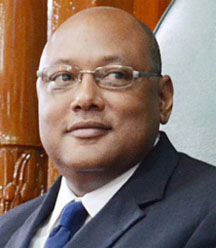In the wake of the country’s offshore oil find announced by Exxon Mobil in May last year, Guyana is beginning to show greater interest in regional discourses on the energy sector.
Natural Resources and Environment Minister Raphael Trotman recently attended a special plenary on Caribbean regional energy integration, part of a key Trinidad and Tobago Energy Conference at the Hyatt Regency in Port of Spain where, according to the Trinidad Guardian, Trotman sought to put the country’s “significant” oil find into perspective.

Trotman, according to the Guardian, said that Guyana is looking to “fill the loopholes” which Trinidad and Tobago left out, but that competing with the twin-island republic or with Caricom is not on the cards.
Mindful, it seemed of not blowing Guyana’s oil trumpet too loudly at a time of continually plummeting prices, Trotman reportedly responded to a question as to whether Guyana could be “the next energy powerhouse in the Caribbean” by invoking the spirit of the Caricom family. “I see us assuming a role, as we’ve always tried to do, as a good member of Caricom. We don’t want to play power politics because we are brothers and sisters,” Trotman was quoted as saying as he deflected the enquiry. He was further reported as saying that it is about working in an integrated way to find synergies and that competing is not an option.
At the same forum Darcy Boyce, Minister in the Office of the Prime Minister of Barbados, referring to the size of T&T’s energy sector, reportedly said: “Barbados does not expect to see a large development of the oil and gas industry. I don’t think it is a matter of absorbing T&T’s workers who were laid off. Our energy sector is small and quite diversified.”
Boyce was also quoted as saying that in the long term the market will determine whether there is any change in the size of the island’s energy sector.
In an interview with Stabroek Business two weeks ago Trotman also took the line of minimizing any excessive national fuss over Guyana’s oil find. Apart from making the point that the current glut of oil on the global market did not particularly provide the ideal incentive for exploitation at this time, the Natural Resources Minister, while not gainsaying the potential economic gain of the country’s oil find appeared to be deliberately playing up the short to medium-term prospects of hydropower.







